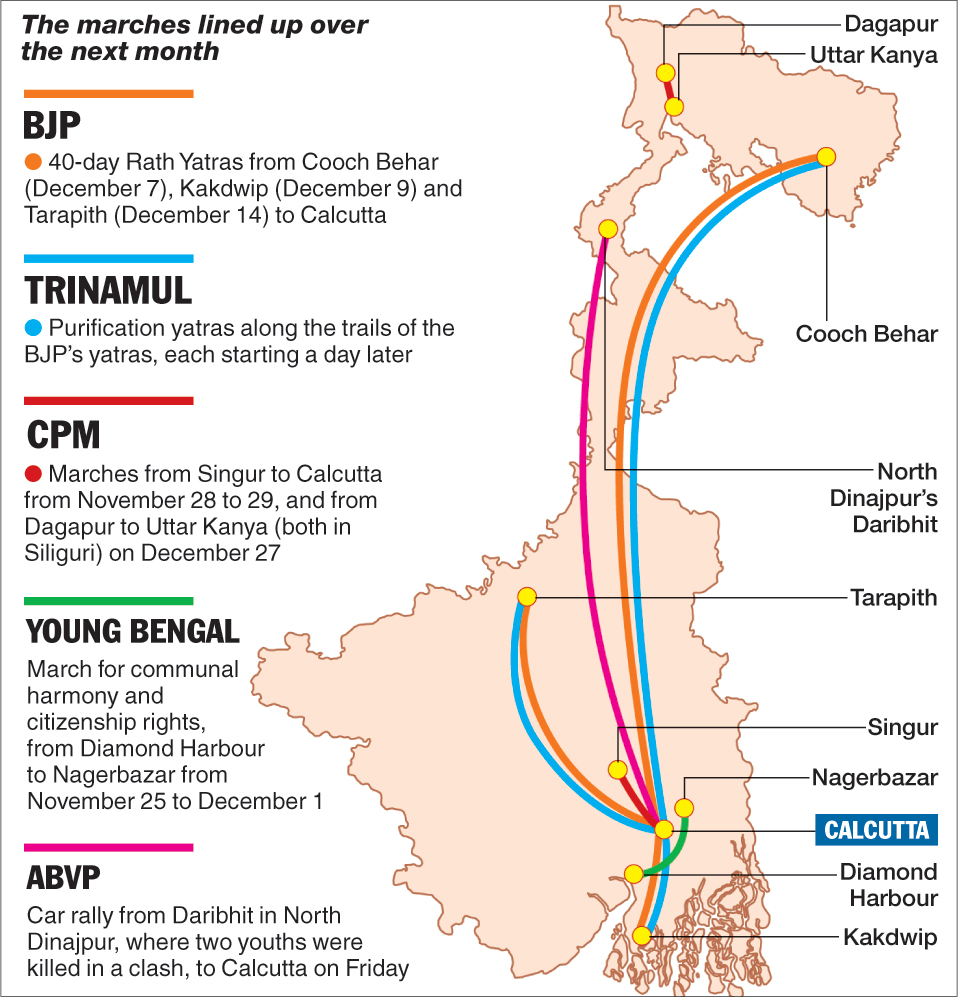Who’s walking?
The CPM, the card-carrying member of the marchers’ club because of its association with China where Mao Zedong and Zhou Enlai had led the path-breaking Long March in 1934-35
The BJP is also doing so but won’t call it so. It will bring out three 40-day Rath Yatras from various parts of Bengal that will converge in Calcutta
Trinamul will take out “purification” marches along the trails of the BJP Rath Yatra a day after the chariots set out
ABVP has opted for a car rally from North Dinajpur’s Daribhit, where two youths died in a clash in front of a school, to Calcutta
Young Bengal is marching from Diamond Harbour to Nagerbazar over communal harmony and citizenship rights.
Why are they sweating it out and why now?
For one reason: elections, elections, elections
How will walking help them?
The long march is useful for those with limited organisational strength and influence limited to certain pockets.
Won’t it be better to focus on local areas than walking long distances?
No. Long marches provide widespread visibility over days in this age of TV cameras and social media. Entrenched players like Trinamul, which have a large base, are also waking up to the benefits of walking.
Who are the pioneers?
Mahatma Gandhi. Remember the Dandi March in 1930?
Mao Zedong and Zhou Enlai in 1934-35
Social reformer Vinoba Bhave, who spearheaded the Bhoodan Movement in 1951
Environmentalist Sunderlal Bahuguna, who led the Chipko movement in the 1970s and also played a key role in the anti-Tehri Dam protests that began in the 1980s
Did only men walk?
No. Women also walked the walk. Notable are Gandhian Mira Behn (the Chipko movement) and Medha Patkar, who led the Narmada Bachao Andolan.
Shadow CM:
Mamata Banerjee is known to walk for long periods at a brisk pace. Before the 2011 elections that pitch-forked her to power, Mamata used to follow then chief minister Buddhadeb Bhattacharjee to places where he held rallies and addressed meetings at the same venue. This earned her the moniker “shadow chief minister”.
Kerala ain’t trailing:
Long marches have remained immensely popular in Kerala. State Congress chief Ramesh Chennithala and the CPM’s Kodiyeri Balakrishnan have taken part in such marches. Chief minister Pinarayi Vijayan has also taken part intermittently. BJP president Amit Shah kicked off a much-publicised march against alleged CPM atrocities last year but left within two days after a controversy erupted over his son's financial deals.
What do the experts say?
“The long march is not a new practice, it's a renewed practice for Bengal. Its return could mark the beginning of a new era in political activism here,” said Biswanath Chakraborty, professor of political science at Rabindra Bharati University.
Not a copycat:
BJP national secretary Rahul Sinha said: “The Rath Yatra is our original concept. We haven’t borrowed from others.”

Telegraph infographic











